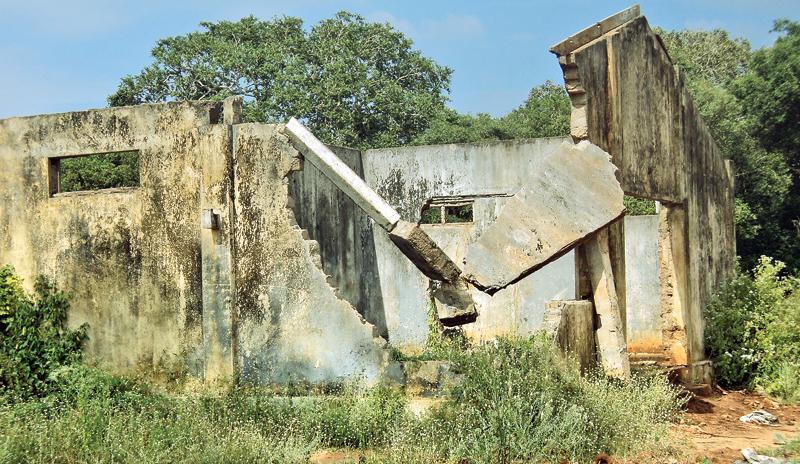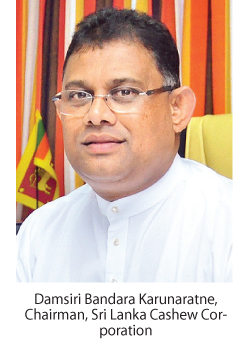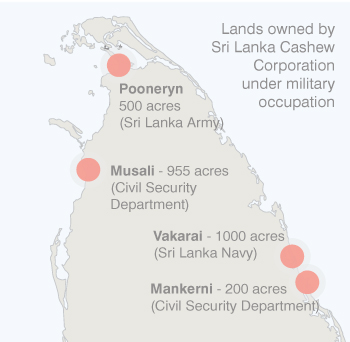
The Sri Lanka Cashew Corporation has lost tens of thousands of acres of fertile cashew plantations in the formerly embattled North and East – with the military continuing to grow the crops but refusing to release the lands citing national security reasons; Army says it is ’ looking into’ the release
The continued military occupation of civilian land in both the North and East has been a bone of contention since the end of Sri Lanka’s long-drawn out conflict. Nine years on, while the government says almost 89 per cent of land occupied by the military has been released back to their rightful owners, state agencies like the Sri Lanka Cashew Corporation (SLCC) have been struggling to recover extensive plantations in the region still under military control. While the focus has been mainly on releasing lands owned by civilians, land once owned by various other government entities appear to have been forgotten.
 According to the Chairman of the Sri Lanka Cashew Corporation, Damsiri Bandara Karunaratne, today almost 3,000 acres belonging to the organisation remains occupied by the military forces. “They continue to grow cashew on these lands and claim the profits,” he says. In Pooneryn, for example, a 500-acre plantation was taken over by the LTTE during the height of the war and they went on to maintain it as though owned by them. Later, Karaunaratne says while the Army was able to recover the land, they have continued to grow cashews on it and refused to hand it back to the Corporation. “We requested them to allow us to purchase cashews from them but even that they refused” Karunaratne revealed adding that instead, the Army calls for tenders for the sale of the produce. “So there are times we cannot even purchase cashews produced on our own lands” he laments.
According to the Chairman of the Sri Lanka Cashew Corporation, Damsiri Bandara Karunaratne, today almost 3,000 acres belonging to the organisation remains occupied by the military forces. “They continue to grow cashew on these lands and claim the profits,” he says. In Pooneryn, for example, a 500-acre plantation was taken over by the LTTE during the height of the war and they went on to maintain it as though owned by them. Later, Karaunaratne says while the Army was able to recover the land, they have continued to grow cashews on it and refused to hand it back to the Corporation. “We requested them to allow us to purchase cashews from them but even that they refused” Karunaratne revealed adding that instead, the Army calls for tenders for the sale of the produce. “So there are times we cannot even purchase cashews produced on our own lands” he laments.
Prior to the country’s conflict years, Cashew was one of the most highly successful commercial crops in the North and East with almost 70,000 acres of plantation land belonging to both the SLCC and private landowners located in the area. During the war, a majority of these plantations were destroyed, and the industry took a major hit as the national cashew harvest dropped drastically.
“This is when the downfall of the cashew industry began” Karunaratne explains. Since the war, military occupation and landmines have kept the SLCC and farmers from returning to the once lucrative plantations.
Among the valuable land belonging to the SLCC occupied by the forces is the Kondachchi Cashew plantation in Musuli, Mannar, once known as the ‘Heart of the Sri Lanka Cashew Corporation’. A vast Cashew cultivating township of 6000 acres with over 200 buildings, it had provided employment to nearly 2000 people in the area. The harvest was so great at the plantation prior to the 1990s that Sri Lanka’s cashew exports were on a much larger scale at that time. While the SLCC has managed to recover some 955 acres of the land, the rest continues to be in the custody of the Civil Security Department.
Also under occupation now is a plantation of 1,000 acres in Vakarai. “That is now controlled by the Navy and was one of the best plots we had,” Karaunaratne says.
Unlike the Army, which has continued to grow the lucrative crop, the Navy has allowed the land to get overgrown and become a jungle.
 The land now in Naval custody in Vakarai is the Corporation’s first plantation, granted to the SLCC by former Prime Minister Sirimavo Bandaranaike to begin commercial cashew cultivation in the country.
The land now in Naval custody in Vakarai is the Corporation’s first plantation, granted to the SLCC by former Prime Minister Sirimavo Bandaranaike to begin commercial cashew cultivation in the country.
When the Corporation tried to get the land back two years ago, the military turned down the request on national security grounds, the SLCC Chairman says.
With national cashew production falling short of the 20,000 metric tonnes demand locally, Karunaratne says the corporation is in the process of trying to increase cultivation in the country.
“It’s critical that the crop is reintroduced in the North and East, that were once home to some of the best cashew plantations in Sri Lanka, in order to increase production,” he said.
The SLCC has also lost a 5,000 acre plantation in Thiriyaya and a 1,000-acre plantation in Madhu due to the war. These lands are currently being held by different state agencies.
In a desperate bid to get back the lands, the SLCC has sought the help of Public Enterprise Minister Lakshman Kiriella. The Corporation is hoping that Minister Kiriella will intervene to get all lands owned by SLCC, released, on an order by President Maithripala Sirisena and the Cabinet of Ministers.
Recovery of the lost lands will be key to boosting the corporation which is barely turning a profit. But it will also increase productivity and uplift the industry as a whole. If the lands are returned, Chairman Karunaratne feels the Corporation will be able to create jobs for a large number of workers in the war-torn regions where cashew plantations thrive.
The SLCC is more than willing to compromise with the military in order to get back the land. “The military can keep their camps and only hand over the plantation area to us,” Karunaratne pleaded.
According to Army Spokesperson Brigadier Sumith Atapattu, Commander of the Sri Lanka Army Lt. General Mahesh Senanayake has already directed the relevant officials to look in to handing over the plantations managed by the Army back to the Corporation. Atapattu says he believes the Army currently holds around 800 acres of land originally owned by the SLCC.
“Therefore we are now in the process to sorting out the matter” he confirmed. But the response of the Sri Lanka Navy and the Civil Defence Security Department remains unknown.
President Sirisena brought the exorbitantly priced nut into national focus a few weeks ago, when he criticised the quality of cashew served on board the SriLankan Airlines, at a public event. The airline nuts were later revealed to have been imports from Dubai.
Karunaratne has set the Corporation the lofty goal of stopping the import of cashew to Sri Lanka within five years and the release of plantations from the military will be key to achieving this.
Issuing a directive last week, President Sirisena said all civilian lands being held by the military must be released by December 31, 2018. As Minister of Defence, he could go one step further, and order his troops to release cashew lands too.
